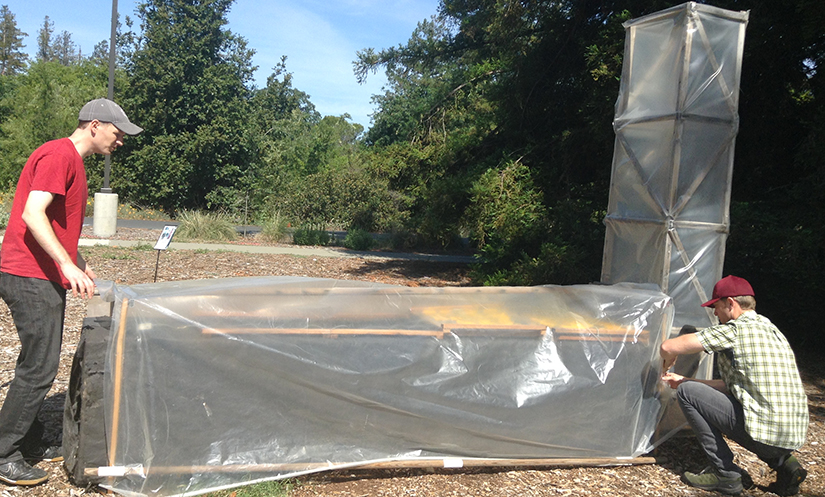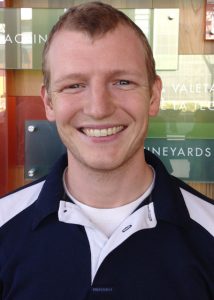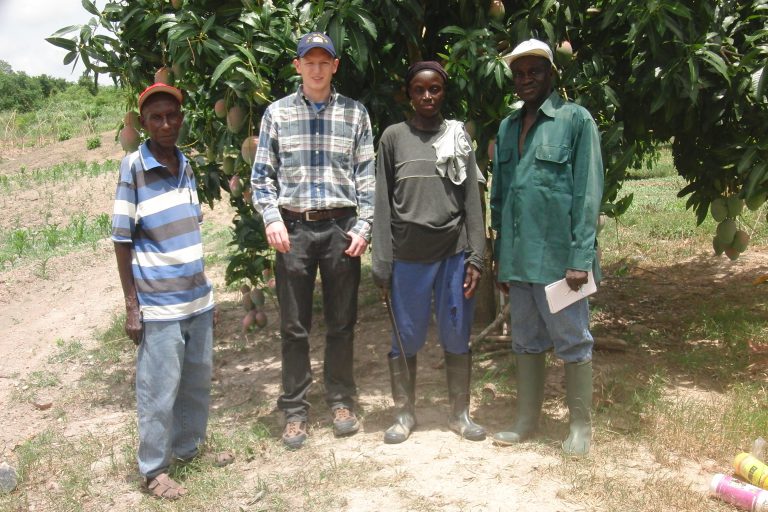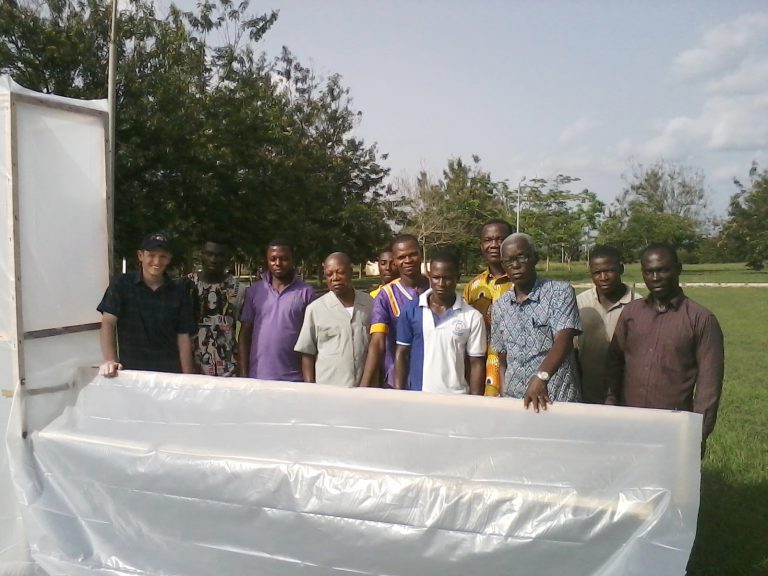

Editor’s note: Nick Reitz is a doctoral student in the UC Davis Department of Food Science and Technology, who participated in a Trellis Fund project led by the Methodist University College Ghana. Here Nick shares some details about his trip to Ghana for this project, which focused on food processing for mango farmers. Though Nick did not have previous experience with mangoes, he had a lot of knowledge to share about postharvest practices. Updated Nov. 6: The Horticulture Innovation Lab has extended the deadline for graduate students to apply for 5 new Trellis Fund projects focused on postharvest handling, small-scale processing and food preservation in Africa.
Question: How does your work on this Trellis Fund project fit into your studies and career, as a Food Science grad student?
Nick Reitz: Prior to this project, I knew almost nothing about mangos. However, my background knowledge of postharvest biology and food processing technology mixed with a fair amount of research helped overcome this lack of knowledge. The basic science behind food preservation is the same regardless of what technology is available. If you know the basics, you can find a method and predict what will happen. Adapting my knowledge to the conditions and resources available in Ghana has been one of the most interesting parts of this project so far.
While I enjoy traveling, learning about other cultures, and learning new languages, this is my first time working in international agricultural development. Help from the Trellis Fund team, Beth Mitcham, and the Horticulture Innovation Lab allowed me to build up the knowledge and resources needed to make the trip and project a success so far.
On a side note, this project has shown me how much I take for granted the staggering amount of resources available to UC Davis students through the library and scientific subscription system. At MUCG, they do not have subscriptions to scientific journals and thus rely mostly on open access journals or textbooks. This makes keeping up to date or doing background research very difficult.
Have you traveled to Ghana or elsewhere in Africa before?
This was my first trip to Africa and only my second time out of North America. I was pleasantly surprised at how kind and welcoming the people of Ghana were, particularly in the Wenchi Region. Everyone greeted me with a smile, and my attempts at even the most rudimentary Twi phrases were met with excitement and attempts at conversation.
One interesting thing I learned: In the local culture, it matters quite a lot what day of the week you were born. Sunday? Well lucky you, you get to be closer to god. The farmers at the workshop asked during an otherwise serious question and answer session what day I was born on. I had no idea. They were amazed, appalled, perhaps even a bit angry. “He doesn’t know what day he was born on? He is only 25, he should remember.” Anyway, I looked it up: Thursday. They laughed and said I was YAWO. I have no idea what this means. Perhaps I am not so close to god.

Tell us about the work you did in Ghana for this Trellis Fund project.
The first two days were spent on tours of two Methodist University College Ghana campuses — MUCG Accra and MUCG Wenchi — and tours of the Wenchi facilities, research plots, and processing centers. During this time, I was accompanied by the project coordinator Mr. Daniel Owusu Kyeremateng, who was a constant source of support prior to and throughout the trip. I was also able to meet college leadership, including the Dean of Applied Sciences, Prof. G. W. K. Mensah; Department Head of Agriculture and Agribusiness, Mr. Joseph Nketiah; and Prof. Emmanuel Marfo. I also met with executives from the Wenchi Mango and Citrus Association for an in-depth discussion on the purpose of the project and the workshops, as well as each party’s role in making them a success.
Next, the Mango Association executives and Mr. Nketiah accompanied me on several farm visits. Farmers were welcoming and excited to show us around the farm. They were interested to hear what I thought of their farms and if they could improve. Coming from the processing and postharvest side of things, I was unable in many cases to make suggestions for their orchards, but Mr. Nketiah was very helpful and used some of this time for extension suggestions on Bacterial Black Spot and pruning of mango trees. These farm visits helped boost interest for the coming workshops and gave me a first-hand look at the common practices and conditions on the farms.
Then we held three workshops to train around 100 mango farmers and sellers in harvest maturity, harvest practices, and postharvest handling. About two-thirds of the participants did not speak English, so the workshops were introduced and interpreted by either Mr. NKetiah or Mr. Kyeremateng. Workshops included presentations, demonstrations, and lengthy discussions which often led to additional, unscheduled demonstrations.
During the second week, I led a seminar on small-scale processing at the university, for about 25 students, some faculty members, Mr. Nketiah, and the college dean. The main theme of the presentation was “Hurdle Technology,” which in food science is the practice creating multiple obstacles (such as salt, low pH, heating, drying) to slow or stop the growth of spoilage microbes.

Throughout my visit, the project team and I planned and built a chimney solar dryer over two days at the MUCG Wenchi campus. We bought supplies from local markets and local carpenters very skillfully constructed the dryer from our plans. Attending the construction process were the Dean Mensah, Prof. Marfo, Mr. Nketiah, Mr. Kyeremateng, a processing staff member, myself, and about 7 students.
What was your favorite moment on this trip?
The level of interest expressed by the farmers made the workshops extremely enjoyable and worthwhile. They had a genuine interest in incorporating the material into their harvest routines.
At the beginning of each workshop, I made it clear that I too was here to learn from them. They took this seriously, and we had very good conversations about fruit maturity indicators they used and very serious problems on their farms.
At one point 35 farmers, Mr. Nketiah, and I ventured out of the classroom to a nearby stand of mango trees and spent a half hour discussing what they saw on their farms. Directly working with mango farmers produced a number of memorable moments like this.
What would you say to other students who might be considering participating in a Trellis project?
Working on a Trellis Fund project will take time, personal effort, and sacrifice. If you choose not to participate, you will almost certainly complete more research and get better grades in courses. However, if you give this project your all and make the most of the opportunity, you will come out with immeasurable experience and perspective you will keep for the rest of your career.
This project has shown me that working in international development can help fulfill my desire to help others with my career. I hope to continue working in development in the future, in addition to working in academic research, teaching, and/or extension. This has been a good first step in including international development work in my career plan.
Editor’s note, updated Nov. 6: The Horticulture Innovation Lab has extended the deadline for graduate students to apply to participate in 5 Trellis Fund projects in Uganda and Ghana, specifically focused on postharvest handling, small-scale processing and food preservation. Students from UC Davis, North Carolina State University, the University of Florida, and the University of Hawai’i at Mānoa are eligible to apply by Nov. 20, 2017 Oct. 27, 2017. Please visit the Trellis Fund webpage for more details and share this information with students who might be interested.
